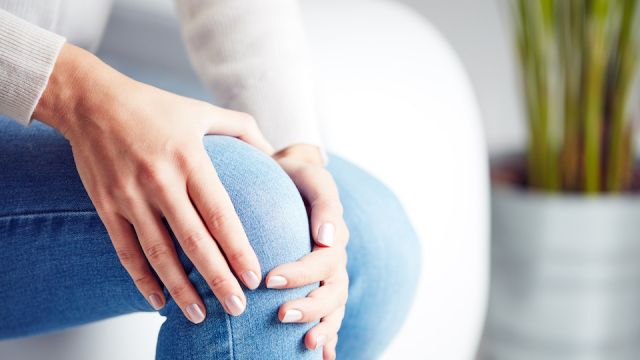How many mornings do you wake up and feel like you have been run over by a truck in your sleep? Joint stiffness and pain are standard, especially in the morning, and can severely interfere with your quality of life. In 2014, the Centers for Disease Control and Prevention reported that 14.6 million Americans had joint pain, and that number appears to be rising. One-third of all adults reported having joint pain within the last 30 days.
Why do my joints hurt?
Joints form the connections between bones and provide support and help you move. Disease or injury can damage joints and make movement difficult and painful. Several conditions can lead to painful joints and include osteoarthritis, bursitis, gout, rheumatoid arthritis, sprains, strains, and other injuries. Lifestyle factors like diet and weight can also have an impact on joint mobility.
BREAKING: Shed 42 lbs In 30 Days With This Simple Night-time Pill
Perhaps you sprained your ankle a few times and now experience pain and stiffness daily. Knee pain is highly common and generally is the result of an old injury.
What’s the deal with morning stiffness?
Stiffness in the back, knees, and feet is a common complaint that is often thought of as an age-related concern. While it is true that joints become stiffer as we age, morning stiffness, and joint pain can be indicators of worn joints, muscle tightness, or inflammation.
As we age, the spongy cushion of cartilage drys out and stiffens. The joint lining also makes less synovial fluid, which lubricates the joint. In addition, weak muscles and stiff tendons tighten up during sleep and take a while to unwind. Both osteoarthritis and rheumatoid arthritis can cause morning stiffness as well.
There is good news for those who suffer from morning joint pain and stiffness
Take on morning joint pain naturally by doing these things.
Check out your diet
Although it may not seem relative, what you eat plays a tremendous role in joint stiffness and pain. Foods that are highly processed or loaded with refined sugar encourage inflammation, which contributes to achy joints. Eat plenty of fresh, whole food, including loads of veggies, fruits, and healthy fats like that found in salmon, nuts, and coconut oil. A healthy diet will also help you maintain a good weight, which takes a lot of pressure off of joints.
Stretch often, especially before you get out of bed
Before you even put your feet on the floor, engage in some gentle stretching to get the blood flowing, and help lubricate your joints.
- Sit up and start with your neck gently circle around and around
- Tilt your head back and forward slowly
- Shrug your shoulders around and around
- Twist your torso side to side
- Spread your legs wide and stretch to touch your toes – don’t force it
- Circle your ankles one way and then another
Once you are up out of bed, bend down gently to touch your toes and reach up high to the sky with your arms. Follow this with some gentle arm circles. Stretch regularly throughout the day, especially if you sit a lot.
Take a hot shower in the morning
Taking a hot shower will help your joints to loosen up before you have to tackle all that the day has in store for you. You can also take a warm bath in the evening with Epsom Salts, which helps to reduce inflammation and joint stiffness.
Exercise
Although it may sound counterintuitive, movement is good for your joints. Regular exercise helps to maintain flexibility within your joints, but it is essential to avoid weight-bearing exercise such as running. Instead, try low impact exercises such as yoga, pilates, or even swimming or water aerobics.
Try acupuncture
Acupuncture is an ancient Chinese therapy that is becoming more popular in mainstream medicine. The therapy involves inserting thin needed into specific points in the body. The idea is to reroute energy and restore balance. The World Health Organization recommends acupuncture for over 100 different conditions, including joint pain. If you do decide to try acupuncture for your joint pain and stiffness, be sure that you do your research to find someone who is licensed and well respected in the field.
Don’t skip the fatty acids
Everyone benefits from having fatty acids in their diet for optimum health. Omega-3 fatty acids have been found to reduce stiffness and joint pain. Omega-3 is found in fish and other seafood and nuts and seeds, including chia seeds, walnuts, and flaxseeds. Another fatty acid that can help is gamma-linolenic acid or GLA. This fatty acid is found in the seeds from several plants, including evening primrose, borage, hemp, and also black currants.
Use turmeric generously
Turmeric, also known as the ‘golden spice’, is common in Indian dishes and contains curcumin that has powerful anti-inflammatory properties. According to NIH, turmeric given to laboratory rats reduced inflammation in their joints. Be sure to always consumer turmeric with black pepper to help with bioavailability.
Get a massage
The Arthritis Foundation recommends regular massaging of arthritic joints to help reduce pain and stiffness and increase range of motion. Work only with a massage therapist who is familiar with bodywork for those with arthritis.
TRENDING: Diabetes Breakthrough Leaves Doctors Speechless - Try This Tonight
Consider herbal supplements
There are many herbal supplements that may help with joint pain and stiffness, including:
- Boswellia
- Bromelain
- Ginkgo
- Stinging nettle
Be sure to check with your doctor before taking any kind of supplement









